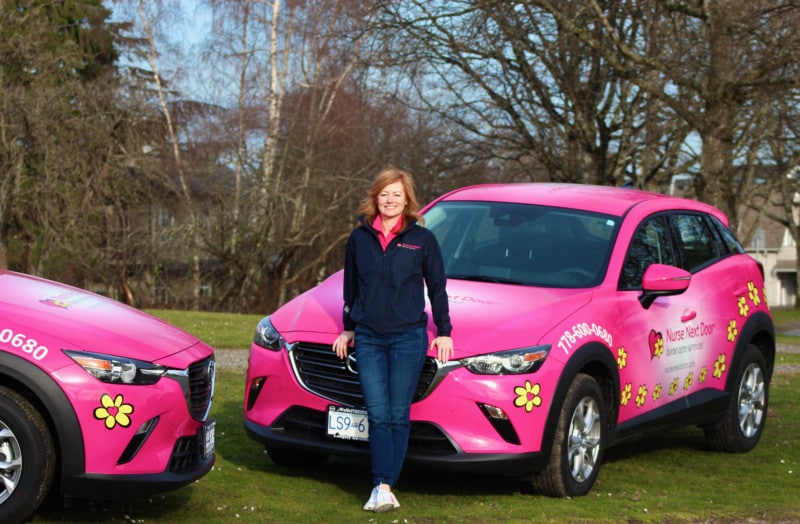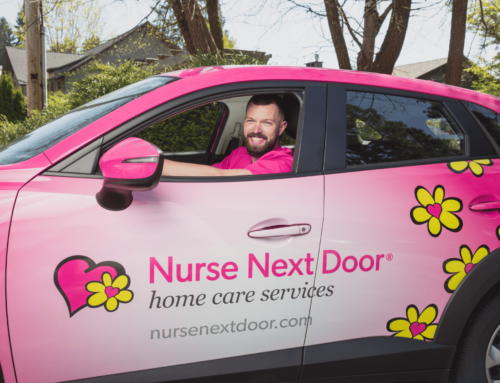In the past, staying at home wasn’t always a viable option for senior citizens who were having difficulty performing daily tasks or had been recently hospitalized for an illness, injury or surgery. Now, with the advent of home health agencies, it is.
People are increasingly opting for the convenience and savings of receiving care and assistance at their residence instead of going to an assisted living facility or being discharged to a senior rehabilitation center.
Getting help from a professional caregiver takes some of the burden off of relatives and gives families peace of mind knowing their loved one has all of the assistance they need to live independently.
If you’ve been searching for care for a relative, or you’ve been considering a career change, a home health agency could be what you’re looking for. But, what is a home health agency? Nurse Next Door has the answers.
In this post, we’ll cover:
- What is home care?
- What is the difference between medical and non-medical home health agencies?
- How to find and choose a home health agency for your loved one
- How to start a home care business
- Starting your own home care business vs. franchising
- Why should you consider Nurse Next Door?
What is Home Care?
A home health agency provides clients, typically senior citizens, with the assistance and care they need to remain at home without compromising their safety. Depending on the type of agency, caregivers or other professionals offer companionship, help with daily activities, personal care, skilled nursing and other therapeutic services. It can be temporary, such as after an illness or injury, or long-term.
What is the Difference Between Medical and Non-Medical Home Care Agencies?
There are two main types of home care businesses, medical and non-medical. Let’s take a closer look at each:
Medical Home Health Care Agency
A medical home care agency, also sometimes called a home healthcare agency, employs or contracts licensed medical professionals, such as registered nurses, licensed practical nurses and physical therapists. These professionals deliver skilled nursing and other therapeutic services to the patient in their home instead of at a hospital, rehabilitation center or outpatient facility.
Services may include:
- Nursing care
- Wound care
- Patient and caregiver education
- Blood pressure checks
- Palliative care
- Physical therapy
- Occupational therapy
- End-of-life care
- Medication administration and management
Because a medical home care agency provides medical care, the regulations and licensing requirements to start this type of business are more stringent. The benefit is that it is a one-stop shop with the ability to address a wide range of client needs, including medical concerns.
Non-Medical Home Care Agency
A non-medical home care agency is geared towards seniors without serious medical needs who require assistance with daily routines and activities. A home care business generally employs caregivers, aides or other non-medical professionals who offer the services necessary for clients to live independently, such as:
- Preparing meals
- Light housework
- Assistance with personal care and hygiene
- Companionship
- Shopping for groceries and essentials
- Transportation to doctors’ appointments, activities, etc.
- Medication reminders
Since a home care agency does not provide medical care, licensing is easier and there are fewer obstacles to starting a business. However, the agency may not be able to meet the needs of seniors who have serious medical conditions.
How to Find and Choose a Home Health Agency for Your Loved One
The thought of finding and choosing a home health agency for a friend or relative can be daunting. However, it doesn’t have to be. At Nurse Next Door, we have over 200 franchise partners across Canada, the United States and Australia, offering all components of care, from companionship to skilled nursing.
We qualify each of our franchise partners and ensure they are able to uphold our vision of premium care. Through our centralized call center, our experts can connect you with a franchise partner who has caregivers that meet your unique needs. Thanks to our Happier Aging philosophy, you can rest assured your family member’s caregiver will help them reconnect with hobbies and interests to bring joy to each visit.
Another way to find an agency is through your loved one’s insurance company or, if they’re a veteran, Veterans Affairs. We work with local and national insurance companies, as well as programs like Veterans Aid, to cover the cost of short-term or long-term home health services for insured clients.
In some cases, when a senior is discharged from the hospital, their physician will provide a list of recommended agencies.
Once you have a home health care agency in mind, don’t be afraid to ask questions! Ask about caregiver training, the organization’s track record and experience, how emergencies are handled, whether any monitoring is in place and anything else you’d like to know. You might also wish to ask for references.
How to Start a Home Health Agency
If you’re passionate about helping others, sales-oriented and a strong leader, starting a home health business could be the ideal way for you to combine purpose and profit. Here’s what’s involved in the process:
Decide Which Services You’ll Offer
The first step is deciding whether you want to open a home care or home health care business. They each offer different types of services. Take a look at our recent post comparing medical vs. non-medical home care businesses and the benefits of each for more detail.
Research the Licensing and Legal Requirements for Home Health Agencies in Your State or Province
Once you decide on the type of home care business you want to launch, it’s crucial that you understand the legal requirements, as well as the licenses you’ll need. These vary by state and province. Some states mandate approved training from local licensing authorities, as well as Medicare and Medicaid certifications before an organization can open for business. Other states and provinces don’t require any form of training.
Check with your local, state/provincial and/or federal government. If you will be providing medical services, getting the right state or provincial licenses can take anywhere from a month to a year, so be sure to set your expectations and timeline accordingly.
At Nurse Next Door, we have a clinical team that will guide you through the licensing process if you do opt to buy a franchise. We also have an in-depth guide on How to Get a License for a Home Health Care Business that discusses everything you need to know.
Create a Business Plan
Next up is creating a business plan. While your specific business plan will depend on your goals and needs, there are general things to include, such as the name of your business, a business description, details on the ownership structure, and plans for marketing, operations and finances.
Choose Insurance
Running a home healthcare business isn’t without risks. If you don’t have the right insurance, you could have to pay damages and legal fees if something goes wrong. If you’ll be hiring employees, you’ll likely need unemployment insurance, worker’s compensation and disability insurance.
You’ll also require professional liability insurance. Professional liability insurance gives you a safety net by protecting your business against negligence lawsuits, medical malpractice, misconduct and other issues. This type of insurance is a must if you’ll be offering medical care.
Determine Your Costs and How to Finance Your Business
The cost of opening a home care agency varies depending on a number of factors, including the type of agency, the state or province you’re in, and the structure and size of your business. Franchising, which we’ll cover in more detail shortly, can take some of the costs and setup work off of your plate.
For many entrepreneurs, financing will be necessary. There are a variety of ways to secure funding or finance a franchise.
Starting Your Own Home Care Business vs. Franchising
Starting a home health care agency from scratch requires a significant amount of research, working capital, business savvy and legwork. You’ll also have to create a whole new brand, build a website and launch marketing campaigns in order to generate brand awareness and tap into business opportunities. All of this can take years.
Owning a franchise, on the other hand, offers a shortcut because you will be part of an established brand. While there are still startup costs and recurring royalty fees, you’re able to step into a proven business formula and take advantage of existing branding, programs and opportunities. Aside from that, you will also have access to training, networking opportunities and support.
Why Should You Consider Nurse Next Door?
If you are thinking about investing in a home health care franchise, Nurse Next Door can help. While there are other franchises out there, we have one thing that the others don’t: centralization. We take care of the admin, so you can be out in the community. We provide our franchise partners with:
- Branding and marketing systems
- A team to handle your scheduling
- 24/7 business support
- Data and analytics to optimize and grow your business
- Powerful technology, including a centralized dashboard for resources, system news and education, a cloud-based scheduling program and other tools
- Attendance monitoring for caregiver and client safety
To learn more about investing in a Nurse Next Door franchise, start the discovery process with us today.

 x
x







